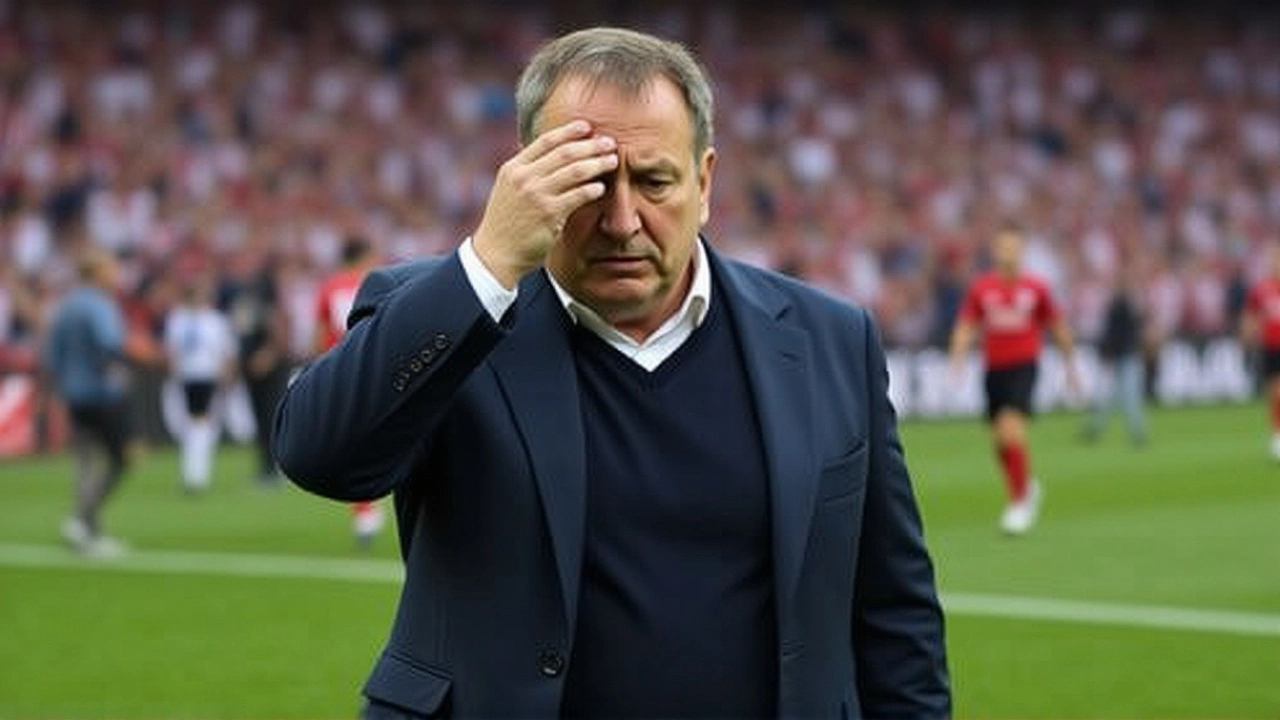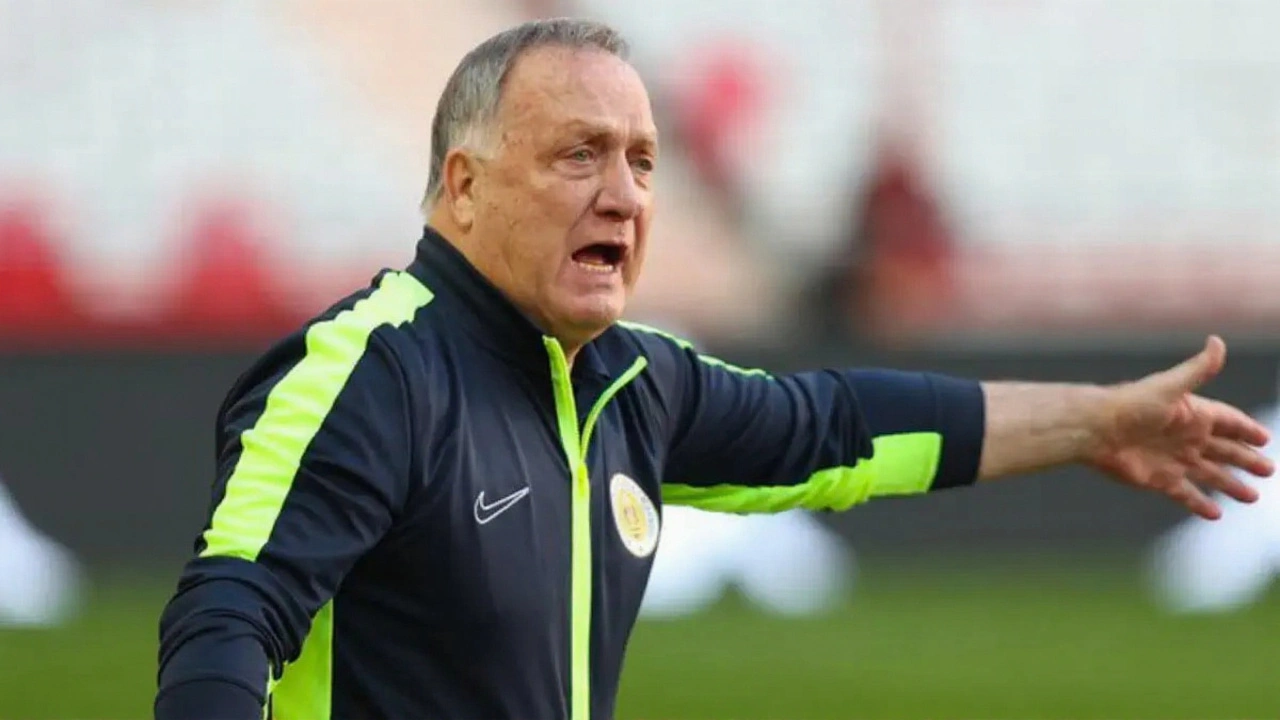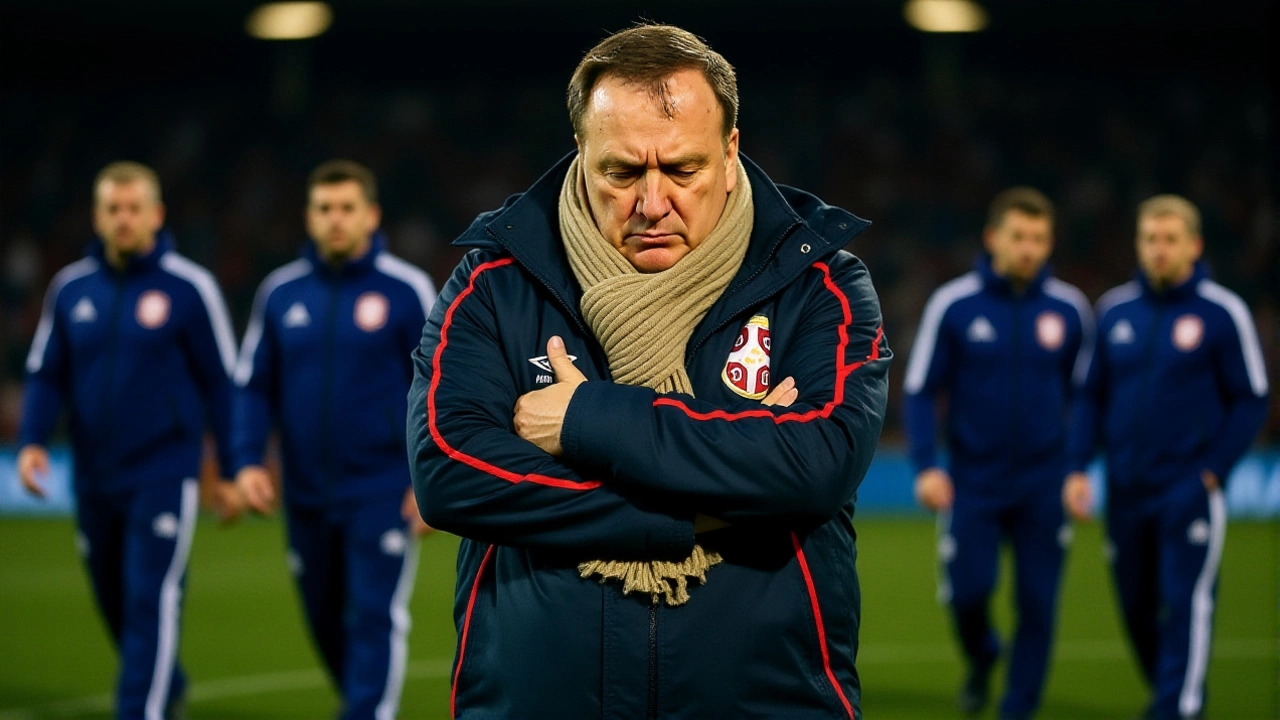When Dick Advocaat walked off the pitch at the Rajko Mitić Stadium on November 14, 2014, he didn’t just leave a football match—he left a sinking ship. Serbia’s 3-1 home defeat to Denmark wasn’t just another loss. It was the final straw. By the next day, Advocaat, 67, had handed in his resignation as manager of the Serbia national team, ending a four-month tenure that began with promise and ended in chaos. The Serbia Football Federation confirmed his departure on November 15, 2014, with a terse statement: ‘He felt there was nothing he could do.’
Four Months, One Point, and a Broken Team
Advocaat arrived in July 2014 with a reputation as a seasoned fixer—former coach of PSV, Zenit, Rangers, and even the Dutch national team. He was hired to steer Serbia through a brutal UEFA Euro 2016 qualifying Group I, where Portugal was the clear favorite. But the team’s early results were disastrous. A 1-1 draw with Armenia in September was followed by a disaster in October: a drone dropped an Albanian flag during Serbia’s home game against Albania. Fans and players erupted. Players clashed on the pitch. The match was abandoned. UEFA awarded Albania a 3-0 win by forfeit—and punished Serbia by forcing their next home game to be played behind closed doors.That next game, against Denmark on November 14, was eerie. No fans. No noise. Just the echo of boots on grass and the weight of expectation. Denmark’s Nicklas Bendtner scored twice, turning a 1-0 Serbian lead into a 3-1 rout. The scoreboard didn’t just reflect a loss—it reflected a collapse.
‘A Problem I Could Not Solve’
Advocaat’s resignation statement was unusually raw for a seasoned coach. ‘I am very sorry our joint project ended like this,’ he said. Then came the line that stuck: ‘Like never before in my career, I was faced with a problem I could not solve.’He wasn’t just talking about tactics. He was talking about morale. About players who seemed to play afraid. About a dressing room fractured by politics, pressure, and the lingering trauma of the Albania incident. The Serbia Football Federation acknowledged it in their statement: ‘The team’s self-confidence had vanished.’
At the time of his exit, Serbia sat joint-bottom of Group I with Azerbaijan—just one point from three matches. Portugal had nine. Albania, the team they’d fought on the pitch, had seven. Denmark, the team that beat them in an empty stadium, had four. Advocaat had inherited a team that had qualified for the 2010 World Cup. He left it broken.

The Fallout: Empty Stands and Neutral Venues
The fallout went beyond the standings. UEFA’s sanctions meant Serbia couldn’t host any more home matches until further notice. Their next qualifier—against Armenia on March 27, 2015—was moved to Sarajevo, Bosnia and Herzegovina. A neutral ground. A symbolic exile.It wasn’t just about punishment. It was about safety. About dignity. About the fact that Serbian football, once a source of national pride, had become a cautionary tale. Players who had once dreamed of representing their country now seemed haunted by the noise they couldn’t control—the drone, the flag, the chaos.
A Manager Who Knew How to Win—But Not How to Heal
Advocaat’s career was built on structure. He won league titles in the Netherlands, Russia, and Scotland. He led Russia to the 2008 Euros. He knew how to organize a team. But football isn’t just about formations. Sometimes, it’s about trust. And in Serbia, trust had evaporated.He had turned down the Australia job in 2006 because Zenit offered him $4 million. He had walked away from Belgium in 2010 amid speculation he’d take over Russia. He was used to power. But in Serbia, power meant nothing if the players didn’t believe.
‘The pressure was too big for this team,’ he said. And maybe that was the real truth. Not that he failed. But that the system around him had failed first.

What’s Next for Serbia?
The Serbia Football Federation didn’t name a successor. The search began immediately. They needed someone who could rebuild morale as much as tactics. Someone who could speak Serbian, understand the cultural weight of the game here, and—most importantly—restore belief.By March 2015, they’d appoint Slavoljub Muslin, a veteran with ties to the region. But the damage from Advocaat’s brief, bruising tenure lingered. Serbia didn’t qualify for Euro 2016. They finished fifth in Group I—out of six teams.
Advocaat returned to the Netherlands, quietly. No press tour. No interviews. Just a man who had done everything right—except the one thing he couldn’t fix.
Frequently Asked Questions
Why did Dick Advocaat resign after only four months?
Advocaat resigned because Serbia earned just one point in three qualifying matches, including a forfeited loss to Albania due to violent fan and player unrest. He cited a complete collapse in team morale and self-confidence, stating he’d never faced a problem he couldn’t solve. The pressure, both internal and external, had become unbearable.
What caused the forfeited loss to Albania?
During the October 14, 2014 match in Belgrade, a drone dropped an Albanian flag into the stadium, sparking violent confrontations between Serbian fans and players and Albanian players. UEFA ruled the match abandoned and awarded Albania a 3-0 win by forfeit, later banning Serbia from hosting home games due to security failures.
Where did Serbia play their next home match after the sanctions?
Serbia’s next scheduled home qualifier, against Armenia on March 27, 2015, was moved to Stadion Grbavica in Sarajevo, Bosnia and Herzegovina, as a neutral venue under UEFA sanctions. They played all remaining ‘home’ matches away from Belgrade for the rest of the qualifying campaign.
How did Advocaat’s tenure compare to other Serbia coaches?
Advocaat’s 138-day stint was one of the shortest and most turbulent in Serbia’s modern history. Unlike predecessors like Siniša Mihajlović, who led Serbia to the 2010 World Cup, Advocaat inherited a team already reeling from political and emotional instability. His failure wasn’t tactical—it was psychological, and it exposed deep fractures in Serbian football culture.
Did Advocaat ever return to international management after Serbia?
No. After resigning from Serbia, Advocaat stepped away from international coaching. He returned briefly to club football in the Netherlands with FC Utrecht in 2015, but never took another national team job. His Serbia experience left him disillusioned, and he later admitted in interviews that the emotional toll was unlike anything he’d faced in 40 years of coaching.
What was the long-term impact on Serbian football?
Serbia failed to qualify for Euro 2016 and has struggled with instability ever since. The incident with the drone and the empty stadiums became symbolic of a deeper crisis: a disconnect between players, fans, and federation leadership. It took years to rebuild trust, and even today, Serbian football is often seen as a team with talent but lacking cohesion—exactly the problem Advocaat couldn’t fix.
